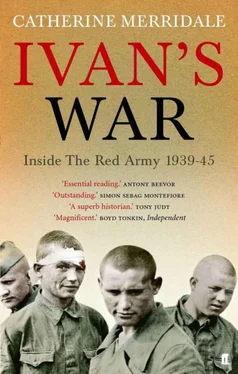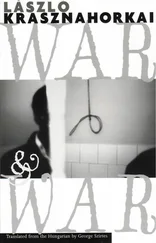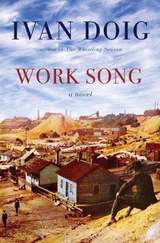There were also wide variations in the soldiers’ ages. The majority of conscripts were born between 1919 and 1925, but older men, including tens of thousands in their forties, were also called up. These were the veterans who remembered the First World War, the men who had known what life under tsarism was like. Their mentality and expectations were entirely different from those of young lads straight from Soviet schools. Some even remembered different kinds of army. That of the Tsars had been hierarchical, its discipline severe, but in the 1920s there had been a brief experiment with classlessness, an attempt to build a people’s army that was free of bombast, formality and gold braid. 30Men who remembered those experimental days were suspicious of drill, watchful, and quick to condemn (or even shoot) their inexperienced young officers. There never was a single army type. After a few months on the road with former peasants, small-time crooks, career soldiers, adolescents, and would-be poets like himself, one conscript, David Samoilov, concluded that ‘a people is not like the processed stuffing ready for history’s sausage-machine… A single language, culture and fate give rise to characteristics that many seem to share, the things that we call national character. But in reality a people is a multiplicity of characters.’ 31
If Soviet culture was not capable of turning out a single type of man, there could be grounds for suspecting that war itself might do so. It is hard to conceive of individuality against a background of industrialized slaughter or even to imagine sensitivity where so much would have been obliterated by smoke, stench and deafening noise. Brutalization – or, as Omer Bartov has it, barbarization – is the word that springs to mind. 32And yet these soldiers, like any others, had dreams and aspirations of their own, ambitions that ranged from promotion or Communist Party membership to a bit of leave, some new boots or a German wristwatch. They continued to write their letters home, to notice changes in the weather, landscapes, the health and breed of local pigs. They made friends, too, and exchanged stories from back home, rolled cigarettes, stole vodka, learned new skills. The front was not merely a theatre of living death. Paradoxically, for those who survived the war presented a new world, landscapes that they would not have seen if they had stayed on the farm. The German army went through the reverse process, marching into a land that struck former workers from Bavaria or Saxony as primitive, barbarous, unlit, unheated, and unwashed. Where some detachments of the Wehrmacht motored to the front, initially, from Paris, the best Red Army soldiers often came from villages where travel meant a five-day walk to town. Some of the riflemen who ransacked Berlin, drinking old cognac out of Meissen cups, had never set foot in a train before the army and this war.
Comparisons with other armies do more than suggest the things that were specific in the Red Army’s culture; they also point to themes that Soviet sources may not highlight on their own. One question, which no writer born in Stalin’s world would even think to ask, is what made any Soviet soldier fight? Combat motivation, like national character, was an issue that preoccupied military experts in the US in the 1950s. The result was a theory about small-group loyalty, the notion that men give their best in battle if they have ‘buddies’, ‘primary groups’, which, unlike ideology or religion, truly command their love. 33The notion eventually inspired new policies on training and the use of reserves, and it has become conventional wisdom for social psychologists and policy-makers alike. But the Red Army does not readily fit the mould. To be sure, battalions would train together behind the lines whenever they were joined by new reserves; or that, at least, was the plan. But when the rates of loss were high, when the average front-line tour of duty for an infantryman, before he was removed by death or serious disability, was three weeks, the small groups seldom lasted long.
High casualty rates afflicted the Wehrmacht as well, and it has been suggested that the place of primary groups in German lines was taken by ideology on the one hand and fear on the other. 34Fear played its part in the Red Army, too, although at first soldiers were more frightened of German guns than of their own officers, paralyzing their ability to fight. 35Ideology also featured centrally in Soviet soldiers’ lives. They had been shaped to see themselves not merely as citizens in uniform but as the self-conscious vanguard of a revolution, the spearhead of just war. But how effective ideology could be in motivating them, and how it jarred or scraped against older beliefs, including religion and traditions of nationalism, remains an open question. Communist rhetoric may have contributed a certain zeal, but it was not accepted universally. Nor was the god-like status of Stalin. In the 1930s, the leader’s name, in capitals, had appeared in pamphlets, newspapers and posters everywhere that Soviet people looked. His face loomed out of wartime newspapers and pamphlets, too, and his name was spelled out on the painted banners that were strung between birch trees to hallow soldiers’ meeting places in the open air. But it is another matter to read allegiance into Stalin’s ubiquitous presence, least of all among troops at the front line. ‘To be honest about it,’ the poet Yury Belash wrote later, ‘in the trenches the last thing we thought about was Stalin.’ 36
To some extent, training built men’s confidence when ideology had failed to convince and comfort them. In 1941, Soviet recruits faced the most professional fighting force the continent had ever seen. By 1945, they had defeated it. Between those dates, there was a revolution in Red Army soldiers’ preparation, in military thinking, in the use and deployment of technology, and in the army’s relationship with politics. These changes, one of the keys to Soviet triumph, affected every soldier’s life, and many wrote and spoke about them. For some, the whole business was irksome, especially when, in honour of the Soviet fascination with American styles of management, the methods used resembled preparation for production lines. But the tide turned, Stalingrad held, and its progress in the next two years suggested that Red Army training methods were increasingly effective. How much they resembled German methods, how much the two sides learned from each other, is one question. Another is the place of party rhetoric, of communist belief, in this most technical of fields.
Finally, there is a problem on which almost every Soviet source is silent. Trauma, in the Red Army, was virtually invisible. Even the toll that the war took on soldiers’ family lives was seldom discussed, 37but shock, and the distress of all that the men witnessed at the front, was virtually taboo. There can have been few battlefields more terrible than Stalingrad, Kerch or Prokhorovka, and few sights more disturbing than the first glimpse of mass extermination, of Babi Yar, Maidanek or Auschwitz. But official accounts say nothing about trauma, battle stress, or even depression. Mental illness, even among troops, is scarcely mentioned in contemporary medical reports. In the guise of heart disease, hypertension or gastric disorders, it haunts post-war hospital records without getting specific attention. The question is not so much whether Red Army soldiers suffered stress as how they viewed and dealt with it.
Linked to this is the long-term problem of their adaptation to the peace. In four short years, Red Army conscripts had turned into professionals, skilled fighters, conquerors. There would be little call for qualities like these while Stalin lived. The journey home could be as confusing as a soldier’s long-forgotten first few weeks in uniform. For many, the confusion continued in the decades to come. The process of adjustment could encompass family problems, poverty, depression, alcohol abuse, violent crime. Perhaps the survivors’ ultimate victory should be measured, in their old age, by their achievement of a kind of ordinariness, by the sharing of tea and sweets, pictures of grandchildren, home-grown tomatoes from the dacha . That triumph, the least spectacular but most enduring, is part of the uniqueness of this generation, an aspect of the special quality that the schoolchildren who helped to inspire this book could sense but did not name.
Читать дальше












